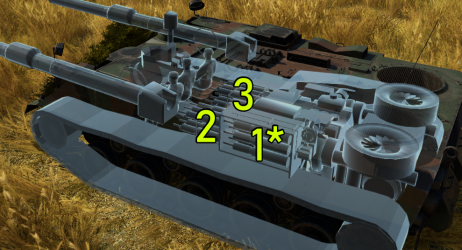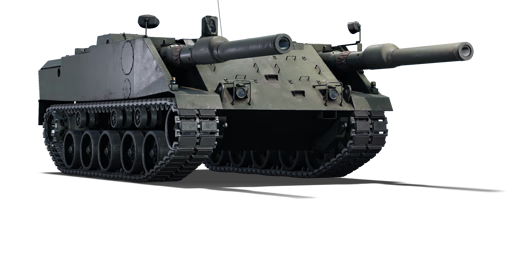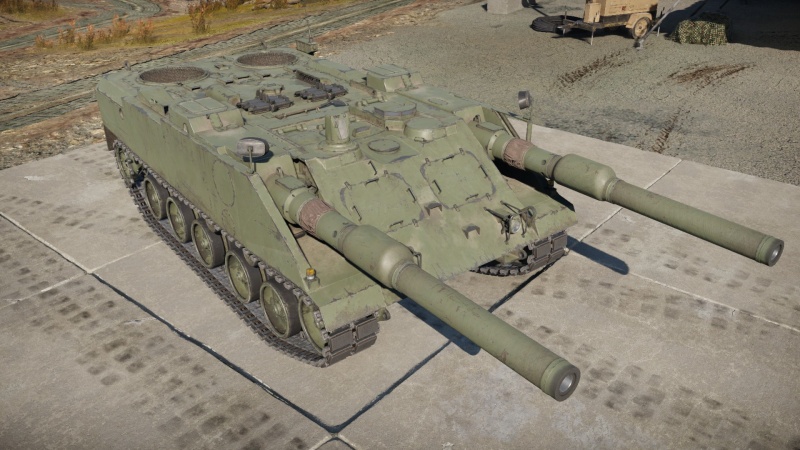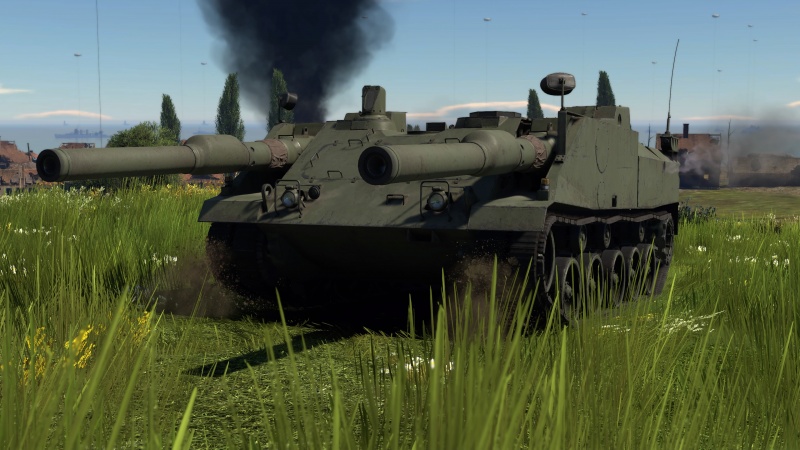Difference between revisions of "VT1-2"
U120654901 (talk | contribs) m (Tag: Visual edit) |
m (→Main armament) (Tag: Visual edit) |
||
| (One intermediate revision by one other user not shown) | |||
| Line 70: | Line 70: | ||
|- | |- | ||
! ''Left'' | ! ''Left'' | ||
| − | | 18 || rowspan="2" | | + | | 18 || rowspan="2" | -10°/+15° || rowspan="2" | 0° || rowspan="2" | Vertical || 5.00 || 5.00 || 5.00 || 5.00 |
|- | |- | ||
! ''Right'' | ! ''Right'' | ||
Latest revision as of 15:26, 28 January 2024
Contents
Description
The Doppelrohr-Kasemattpanzer Versuchsträger VT1-2 (lit. Double-barreled casemate test vehicle) is a gift rank German tank destroyer with a battle rating of (AB), (RB), and (SB). It was introduced during Update 1.91 "Night Vision" as a reward for the 2019 Operation "Shipyard" event.
The VT1-2 was the outcome of a project envisioned to create a successor for the Leopard 1. Its main focus was on the importance of firepower and speed, hence the dual Rheinmetall L44 (120 mm) cannons and non-existent armour. However the VT1-2 is still a very effective tank at its battle rating, with the left cannon possessing an auto-loader the VT1-2 can shoot 3 shells in 5 seconds. Not to mention the type of shells the VT1-2 possess, in this case the DM12 HEAT-FS which has 480 mm of penetration. The VT1-2 has a very fast hull traverse rate and can reach the speeds of 70 km/h in a matter of seconds.
General info
Survivability and armour
The VT1-2 has essentially no armour. With only 50 mm at the front, most incoming fire at its battle rating will result in the tank being potentially rendered useless or destroyed. Also the survivability of the crew is non-existent as all 3 crewmen are neatly lined up in a row, 1 nicely lined up shell would be enough to knock the crew out.
| Armour | Front (Slope angle) | Sides | Rear | Roof |
|---|---|---|---|---|
| Hull | 80 mm Front glacis 110 mm Lower glacis |
50 mm Front 30 mm Rear |
30 mm | 30 mm Front 20 mm Rear |
Notes:
- Suspension wheels are 15 mm thick and tracks are 20 mm thick.
- 10 mm structural steel located behind ammunition racks.
- 10 mm structural steel located on the right side of the auto-loader rack.
- 12.7 mm machine guns can penetrate the the side armour at a specific point and possible kill the driver and gunner.
Mobility
| Game Mode | Max Speed (km/h) | Weight (tons) | Engine power (horsepower) | Power-to-weight ratio (hp/ton) | |||
|---|---|---|---|---|---|---|---|
| Forward | Reverse | Stock | Upgraded | Stock | Upgraded | ||
| Arcade | Expression error: Unexpected * operator. | 2782 | Expression error: Unexpected round operator. | __.__ | |||
| Realistic | 1946 | Expression error: Unexpected round operator. | __.__ | ||||
The VT1-2 has the ability to climb to speeds of 70 km/h in a matter of seconds, with the help of 8 reverse gears, the reversing top speed is also 70 km/h. One of its features is the ability to adjust its suspension to allow it to change only its pitch (i.e lower the front and raise the back or vice versa), the height and roll cannot be adjusted. If the VT1-2 pitches up or down too much its top speed and manoeuvrability is significantly reduced, so it is recommended that the be lowered up to a point where speed and manoeuvrability is not negatively reduced to maximise gun depression and mobility.
Modifications and economy
Recommended research path:
- Parts
- FPE
- Adjustment of Fire (absolutely necessary for sniping)
- Brake System (in order to be able to react and aim)
- Filters
- Elevation Mechanism
- DM23
- Laser rangefinder
Armaments
Main armament
| Dual 120 mm Rh120 L/44 | Reloading rate (seconds) | |||||||
|---|---|---|---|---|---|---|---|---|
| Capacity | Vertical | Horizontal | Stabilizer | Stock | Full | Expert | Aced | |
| Left | 18 | -10°/+15° | 0° | Vertical | 5.00 | 5.00 | 5.00 | 5.00 |
| Right | 12 | 9.75 | 8.63 | 7.95 | 7.5 | |||
Ammunition
| Penetration statistics | |||||||
|---|---|---|---|---|---|---|---|
| Ammunition | Type of warhead |
Penetration @ 0° Angle of Attack (mm) | |||||
| 10 m | 100 m | 500 m | 1,000 m | 1,500 m | 2,000 m | ||
| DM13 | APFSDS | 393 | 390 | 384 | 376 | 367 | 359 |
| DM12 | HEATFS | 480 | 480 | 480 | 480 | 480 | 480 |
| DM23 | APFSDS | 410 | 408 | 401 | 393 | 384 | 376 |
| Shell details | ||||||||||||
|---|---|---|---|---|---|---|---|---|---|---|---|---|
| Ammunition | Type of warhead |
Velocity (m/s) |
Projectile mass (kg) |
Fuse delay (m) |
Fuse sensitivity (mm) |
Explosive mass (TNT equivalent) (kg) |
Ricochet | |||||
| 0% | 50% | 100% | ||||||||||
| DM13 | APFSDS | 1,650 | 4.44 | - | - | - | 78° | 80° | 81° | |||
| DM12 | HEATFS | 1,140 | 13.5 | 0.05 | 0.1 | 2.15 | 65° | 72° | 77° | |||
| DM23 | APFSDS | 1,640 | 4.3 | - | - | - | 78° | 80° | 81° | |||
Ammo racks

| Full ammo |
1st rack empty |
2nd rack empty |
3rd rack empty |
Visual discrepancy |
|---|---|---|---|---|
| 30 | 6 (+12) | 12 | 12 | No |
Notes:
- The first ammo rack is for the auto-loader
- The first rack will replenished with the 2nd ammo rack's ammunition
Usage in battles
The VT1-2 excels when it comes to acceleration, high speed and low profile. This provides the opportunity to move into sniping positions early in the game or even capture midpoints. The tank is easily destroyed and should be played as if it was a glass cannon, i.e. you stay behind cover/concealment and scan the area using binoculars and/or the third-person view and then only moving into firing position when the coast is clear.
Engaging the enemy
Since the left barrel reloads at a constant 5 second rate and the right barrel in around 7 seconds, you can fire 3 shots within 5 seconds (left, right, left again) in the first engagement which lets you easily correct any error in distance estimation and/or finish off immobilized tanks. Using a custom sight from live.warthunder.com (such as this sight by shangxiang) is recommended in order to be able to quickly fire the second barrel without having to switch between armaments.
Things to be aware of
Be aware of guided missiles from helicopters on open maps. If you see helicopters, you might need to change plans and hide. Furthermore, if you have sniped 2+ enemies, the revenge plane is a common sight and you are an easy target for them unless you change position and move into a forest or populated area. In addition, the VT1-2 is often described as a "glass cannon", meaning that you must be wary of your surroundings as anything from an anti-air autocannon to any tank round poses a real threat to you, not to mention that your crew is seated in between your guns. This area is very lightly armoured just like the sides, so close range engagements with your sides exposed is not recommended.
Pros and cons
Pros:
- Incredibly good mobility on and off road, courtesy of its extremely powerful engine
- Twin 120 mm cannons are unrivalled at its rank:
- HEAT-FS and APFSDS can penetrate almost any tank it encounters
- Able to shoot 3 times within 5 seconds
- One cannon is equipped with an autoloader
- Very quick hull traverse
- Due to the gun layout, the VT1-2 can position itself to fire one cannon while the other is behind cover
Cons:
- Thin, mild steel armour cannot resist anything resembling anti-tank fire as low as 12.7 mm machine guns
- 3 crew members are grouped together in the front of the tank, poor survivability
- Cannons cannot traverse horizontally, hull aiming mechanic must be used for precise fire
- Very difficult to fire on the move
- No machine guns for fending off aircraft, highly vulnerable to air attack
- No access to smoke grenades/shells/systems
- Due to hull aiming, the hull tends to roll back or forward depending on terrain
- When loading ammo on a capture point, the left ammo rack is fully loaded first, then the right ammo rack.
History
The project for an experimental turretless tank was started for development in Germany in the early 70's as part of the replacement program for the Leopard 1. The unusual layout of the "casemate" tank type had several advantages: the possibility of installing two cannons at once, increased protection due to low silhouette and enhanced protection in the hull front profile and also increased mobility due to a reduced weight compared to traditional tanks. As part of this innovative project, two vehicles were built under the general name of Versuchsträger (German: experimental platform). The first VT1-1 prototype was placed on a shortened chassis and was equipped with two 105mm rifled cannons with manual loading.
On the second VT1-2, two 120 mm calibre smoothbore cannons were used - the left cannon mounted with an automatic loader mechanism. Both of these prototypes used a number of parts and assemblies from the European "long-term production" experimental KPz-70. Since both vehicles were intended exclusively for the testing and development of new battle tactics, they were made from structural non-armour steel. Tests carried out by several NATO block countries, but they all left the project one by one and in 1985, Germany itself refused further development in favour of developing the Leopard 2 which was created according to a classic tank scheme.
- From Devblog
Media
- Skins
- Sights
- Videos
See also
Links to the articles on the War Thunder Wiki that you think will be useful for the reader, for example:
- reference to the series of the vehicles;
- links to approximate analogues of other nations and research trees.
External links
| Germany tank destroyers | |
|---|---|
| Pz. I Derivatives | Panzerjäger I |
| Pz. II Derivatives | 15cm sIG 33 B Sfl |
| Pz. 38(t) Derivatives | Marder III · Marder III H · Jagdpanzer 38(t) |
| Pz. III Derivatives | StuG III A · StuG III F · StuG III G · StuH 42 G |
| Pz. IV Derivatives | Jagdpanzer IV · Panzer IV/70(A) · Panzer IV/70(V) · Dicker Max · Nashorn · Brummbär · VFW |
| Pz. V Derivatives | Jagdpanther G1 · Bfw. Jagdpanther G1 |
| Pz. VI Derivatives | Sturer Emil · Elefant · Ferdinand · 38 cm Sturmmörser · Jagdtiger |
| Wheeled/Half-track | 8,8 cm Flak 37 Sfl. · Sd.Kfz.251/9 · Sd.Kfz.251/10 · Sd.Kfz.251/22 · Sd.Kfz.234/3 · Sd.Kfz.234/4 · 15 cm Pz.W.42 |
| ATGM Carrier | RakJPz 2 · RakJPz 2 (HOT) · Wiesel 1A2 |
| Other | Waffenträger · M109G · JPz 4-5 · Raketenautomat · VT1-2 |







